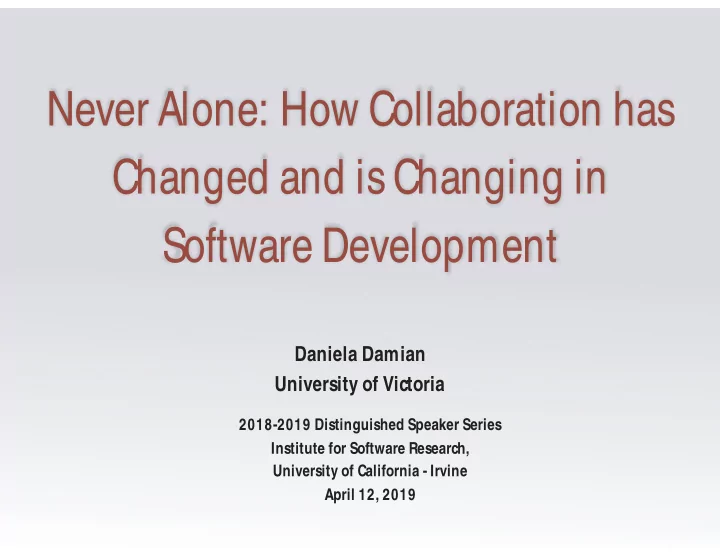

Never Alone: How Collaboration has Changed and is Changing in Software Development Daniela Damian University of Victoria 2018-2019 Distinguished Speaker Series Institute for Software Research, University of California - Irvine April 12, 2019
https://www.mytechlogy.com/IT -blogs/3312/do-we-bene fi t-from-the-eternal-microsoft-vs-apple-war/#.XKUsX-tKhSM
http://transformingbusiness.economist.com/negotiating-in-the-digital-age/
collaborate to innovate by leveraging talent at remote sites proximity to customers
? = distributed issue resolution 2.5 times longer than co-located Herbsleb, J. and R. Grinter: Splitting the Organization and Integrating the Code: Conway’s Law Revisited, ICSE , 1999
OUR INVESTIGATION IBM Jazz development T eam, 2007
��������� ������ ��������� ��������� ������� ������� ������ ��� ���� ����������� ���� ������� ���� ���� �� �� = no practically significant delay due to distance Wolf, T ., T . Nguyen and D. Damian: Does Distance still Matter?, Software Process: Improvement and Practice , 2008
Effective communication through a core set of contributors
FOCUS ON PERFORMANCE Hierarchical Brokers Complete Build Build Build Result 1 Result 2 Result 3 Network 2 Network 3 OK OK ERROR ERRO RO OR OK OK SCM Repository time
FOCUS ON PERFORMANCE Communication model predicted about 70% of failed builds Wolf, T ., et al : Predicting build failures using social network analysis on developer communication, ICSE, 2009
from Co-located to Distributed communication matters!
from Co-located to Distributed collaboration quality greatly affects software success
Closed source, corporate-led contributions, intra - and inter-organizational partnerships
trust awareness cultural affinity aligned autonomy
Innovate through decentralized, large contributor base https://medium.com/@ Intersog/no-more-an-intellectual-property-destroyer- fi ve-trends-in-open-source-cloud-computing-8887e5d23db9
EARLY STUDIES OF OSS socio-technical congruence the more active contributors are also the more active communicators Bird, C.: Sociotechnical coordination and collaboration in open source software, ICSM 2011
from Closed to Open communication medium might not matter!
from Closed to Open governance based on quality of work
THE GITHUB REVOLUTION
Blincoe, K, F. Harrison, N. Kaur, D. Damian: Reference Coupling: An Exploration of Inter-project Technical Dependencies and their Characteristics within Large Software Ecosystems, Information and Software Technology, 2019
communities are highly interconnected
the largest connected component: 57 % ( about 10K projects )
largest connected (giant) component in Github Blincoe, K, F. Harrison, N. Kaur, D. Damian: Reference Coupling: An Exploration of Inter-project Technical Dependencies and their Characteristics within Large Software Ecosystems, Information and Software Technology, 2019
SOCIAL BEHAVIOUR ALIGNED WITH TECHNICAL DEPENDENCIES? Project Owners followed by other Owners in their ecosystem
FIRM-SPONSORED OSS “As a software company, it’s impossible to keep up if you have to write every line of code yourself, instead of using solutions that multiple organizations and countless individuals are developing collectively on a massive scale” Mike Evans, vice president of technical business development at Red Hat.
THE COOPETITION ERA
“ [ Open ] Software is becoming the leading technique by which companies both compete and collaborate with one another” Mike Milinkovich, executive director of theEclipse Foundationand a board member of the � Open Source Initiative
APACHE HADOOP Platform providers Platform users Infrastructure providers Service providers Platform supporters Linaker, J., et al. , : How Firms Adapt and Interact in Open Source Ecosystems, REFSQ, 2016
Linaker, J., et al. , : How Firms Adapt and Interact in Open Source Ecosystems, REFSQ, 2016
Social Network Measures and In fl uence in the Ecosystem
In fl uence through: issues reported and included in release issues interacted with and included in release
collaboration patterns linked to in fl uence in the ecosystem
THE WEBKIT ECOSYSTEM 2006: Apple releases WebKit 2007-2008: Apple releases the iPhone Intel Nokia 2011-2013: Nokia - Intel further apart 2008-2011 Samsung and Apple coopetition Nokia and Intel break out due to Nokia-Microsoft partnership Teixera, J.: Understanding Coopetition in the Open-Open-Source Arena: The cases of WebKit and OpenStack, OpenSym, 2014
from Cooperation to Coopetition the Customer is King
from Cooperation to Coopetition Increased collaboration — > competitive advantage
Open source platform and ecosystem , community contributions, software grows organically
PROPRIETARY PLATFORM S
IBM CLM ECOSYSTEM
jazz.net: open issue tracker
Atlassian’s open issue tracker
OPEN COM M ERCIAL ECOSYSTEM
Knauss, E. et al : Continuous clari fi cation and emergent requirements fl ows in open-commercial software ecosystems, RE Journal, 2018
Knauss, E. et al : Continuous clari fi cation and emergent requirements fl ows in open-commercial software ecosystems, RE Journal, 2018
openness trade-offs
OPEN COMMERCIAL ECOSYSTEM Closed source, open stakeholder communication, corporate-led contributions, inter-organizational partnerships
COLLABORATION AT SCALE
PROPRIETARY PLATFORM S
from Product to Platform providing the best products to developing the best network of complementors (collaborators)
from Product to Platform from end-user oriented to end-user and partner -oriented
from Product to Platform from self-reliant to team player
from Product to Platform shared risk management in developing software
Open API platform ecosystem , self-regulated community contributions, inter -organizational partnerships
strategic governance quality of integrations platform innovation to enable external product innovation
OPEN COLLABORATION AND INNOVATION AT SCALE COLLABORATIVE INNOVATION
CO-INNOVATION AT LARGE SCALE
A RESEARCH AGENDA Models of innovation within different types of ecosystems Ecosystem tradeoffs and implications for Software Engineering platform openness < — -> quality of integrations
THANK YOU
THANK YOU Daniela Damian University of Victoria 2018-2019 Distinguished Speaker Series Institute for Software Research, University of California - Irvine April 12, 2019
Recommend
More recommend